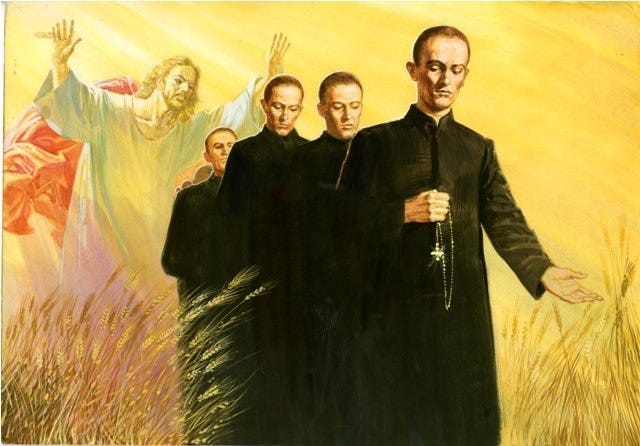God’s eternal love transcends all the limits of the world. He said: “Go therefore and make disciples of all men (Mt 28:19)” so that His love may be known throughout all the earth. By virtue of our baptism, we, as a Church, have the mandate from Jesus himself to go into the world in whatever possible way we can. We are his hands and feet, extending His healing touch to all the people. We are missionaries of God’s love and mercy!
As a missionary Church, we have the three-fold responsibility:
To proclaim the Word of God [kerygma-martyria].
To celebrate the sacraments [leitourgia].
To exercise the ministry of charity [diakonia] (cf., CICLSAL, Proclaim [P], 19).
God joyfully extends His tender gaze and loving touch upon his people through these three-fold missionary works. With these responsibilities, we could be missionaries with joined hands and open arms, depending on where God wants us to be. Some become walking missionaries with callused hands and feet, and some are kneeling missionaries with callused knees.
Like St. Therese of the Child Jesus, the Patroness of the Missions, our Founder, St. Hannibal Mary, understood very well the need for the mission. Thus, he even wanted to go to mission ad gentes but could not because of his pressing works at Avignone. He sighed: “Oh, if I had the grace to be a missionary (The Father’s Soul [TFS], p.44). But he understood at the same time that he still could become a missionary on his knees, saying, “we are giving our spiritual contribution through the Rogation by winning the workers for the rich harvest of the mystical barns and for the eternal kingdom! (RA, p 449).” “Who knows how many hundreds of thousands of vocations the Lord keeps in store? But how can people claim to have them without praying? (The Father’s Letters [TFL], p, 661).”
It is of utmost importance, therefore, that we pray for more good and holy missionaries; to support those already in different mission fields with our prayers and penances so that they may truly become the hands and feet of Jesus. That they may be united and always reflecting Jesus, the Missionary par excellence, in their lives because “it is from contemplation, from a strong friendship with the Lord that the capacity is born in us to live and to bring the love of God, his mercy, his tenderness to others (P, 17)”.
On the other side, St. Hannibal Mary “nurture the holy ideal of foreign missions in the infidels’ lands such as Africa, China, Americas, Oceania, Indies, Russia, etc. (Rogationist Anthology [RA], p. 447).” He wanted his sons and daughters to go throughout all the corners of the world to “foster the hope of gathering and educating the Holy Childhood and the savage children in order to practice the works of charity, instruction and civilization; to make Jesus known and loved by the infidels; and to set the slaves free (RA, p. 447).” Thanks to our Rogationist mission enthusiast confreres, many of these dreamlands of our Father Founder have already been reached, but notwithstanding, the mission field is still vast.
Although we are all missionaries by our baptism, however, it is crucial to take note that “only the mission [ad gentes] enthusiasts who are firmly resolved to face travels, inconveniences, want, and perils; who feel the divine impulse to bear witness of their love toward Jesus through martyrdom will be appointed to such an apostolate (TFS, p. 44; RA, p. 448).” This can only happen when that person is totally and continually united in Jesus, walks with Jesus, and works for Jesus, never longing for mission out of spiritual pride (cf., RA, p. 450). Otherwise, “they would instead slacken, jeopardizing their perseverance in time of persecutions (RA, p. 451).”
For us Rogationists to become true missionaries, the XIII General Chapter tells us that we need to embody these three elements: to stay, pray, and go (cf., RRLT: USC, 57). To Stay means to understand well why we need to pray and go. In this understanding of this divine command to pray, the natural source of the zeal that impels us to be its proclaimers and propagators (cf., RRLT: USC, 59) is founded. With this understanding and zeal, therefore, we become truly missionaries of the Rogate in whatever field of apostolate we are assigned to.
Fr. Marcelino Diaz II, RCJ, is currently the Responsible for the Rogamina Community of the St. Matthew Province in Mina, Iloilo, Philippines. The Rogamina Community aims to follow Jesus’ call for unceasing prayer, especially for more and holy vocations, in the monastic-contemplative lifestyle.



